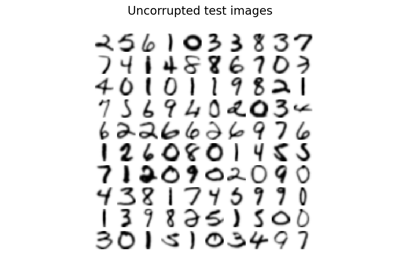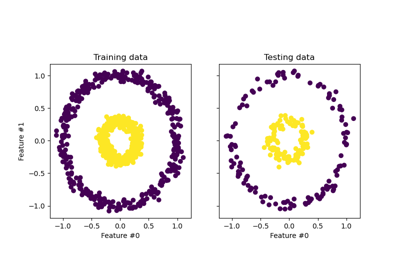KernelPCA#
- class sklearn.decomposition.KernelPCA(n_components=None, *, kernel='linear', gamma=None, degree=3, coef0=1, kernel_params=None, alpha=1.0, fit_inverse_transform=False, eigen_solver='auto', tol=0, max_iter=None, iterated_power='auto', remove_zero_eig=False, random_state=None, copy_X=True, n_jobs=None)[source]#
Kernel Principal component analysis (KPCA).
Non-linear dimensionality reduction through the use of kernels [1], see also Pairwise metrics, Affinities and Kernels.
It uses the
scipy.linalg.eighLAPACK implementation of the full SVD or thescipy.sparse.linalg.eigshARPACK implementation of the truncated SVD, depending on the shape of the input data and the number of components to extract. It can also use a randomized truncated SVD by the method proposed in [3], seeeigen_solver.For a usage example and comparison between Principal Components Analysis (PCA) and its kernelized version (KPCA), see Kernel PCA.
For a usage example in denoising images using KPCA, see Image denoising using kernel PCA.
Read more in the User Guide.
- Parameters:
- n_componentsint, default=None
Number of components. If None, all non-zero components are kept.
- kernel{‘linear’, ‘poly’, ‘rbf’, ‘sigmoid’, ‘cosine’, ‘precomputed’} or callable, default=’linear’
Kernel used for PCA.
- gammafloat, default=None
Kernel coefficient for rbf, poly and sigmoid kernels. Ignored by other kernels. If
gammaisNone, then it is set to1/n_features.- degreefloat, default=3
Degree for poly kernels. Ignored by other kernels.
- coef0float, default=1
Independent term in poly and sigmoid kernels. Ignored by other kernels.
- kernel_paramsdict, default=None
Parameters (keyword arguments) and values for kernel passed as callable object. Ignored by other kernels.
- alphafloat, default=1.0
Hyperparameter of the ridge regression that learns the inverse transform (when fit_inverse_transform=True).
- fit_inverse_transformbool, default=False
Learn the inverse transform for non-precomputed kernels (i.e. learn to find the pre-image of a point). This method is based on [2].
- eigen_solver{‘auto’, ‘dense’, ‘arpack’, ‘randomized’}, default=’auto’
Select eigensolver to use. If
n_componentsis much less than the number of training samples, randomized (or arpack to a smaller extent) may be more efficient than the dense eigensolver. Randomized SVD is performed according to the method of Halko et al [3].- auto :
the solver is selected by a default policy based on n_samples (the number of training samples) and
n_components: if the number of components to extract is less than 10 (strict) and the number of samples is more than 200 (strict), the ‘arpack’ method is enabled. Otherwise the exact full eigenvalue decomposition is computed and optionally truncated afterwards (‘dense’ method).- dense :
run exact full eigenvalue decomposition calling the standard LAPACK solver via
scipy.linalg.eigh, and select the components by postprocessing- arpack :
run SVD truncated to n_components calling ARPACK solver using
scipy.sparse.linalg.eigsh. It requires strictly 0 < n_components < n_samples- randomized :
run randomized SVD by the method of Halko et al. [3]. The current implementation selects eigenvalues based on their module; therefore using this method can lead to unexpected results if the kernel is not positive semi-definite. See also [4].
Changed in version 1.0:
'randomized'was added.- tolfloat, default=0
Convergence tolerance for arpack. If 0, optimal value will be chosen by arpack.
- max_iterint, default=None
Maximum number of iterations for arpack. If None, optimal value will be chosen by arpack.
- iterated_powerint >= 0, or ‘auto’, default=’auto’
Number of iterations for the power method computed by svd_solver == ‘randomized’. When ‘auto’, it is set to 7 when
n_components < 0.1 * min(X.shape), other it is set to 4.Added in version 1.0.
- remove_zero_eigbool, default=False
If True, then all components with zero eigenvalues are removed, so that the number of components in the output may be < n_components (and sometimes even zero due to numerical instability). When n_components is None, this parameter is ignored and components with zero eigenvalues are removed regardless.
- random_stateint, RandomState instance or None, default=None
Used when
eigen_solver== ‘arpack’ or ‘randomized’. Pass an int for reproducible results across multiple function calls. See Glossary.Added in version 0.18.
- copy_Xbool, default=True
If True, input X is copied and stored by the model in the
X_fit_attribute. If no further changes will be done to X, settingcopy_X=Falsesaves memory by storing a reference.Added in version 0.18.
- n_jobsint, default=None
The number of parallel jobs to run.
Nonemeans 1 unless in ajoblib.parallel_backendcontext.-1means using all processors. See Glossary for more details.Added in version 0.18.
- Attributes:
- eigenvalues_ndarray of shape (n_components,)
Eigenvalues of the centered kernel matrix in decreasing order. If
n_componentsandremove_zero_eigare not set, then all values are stored.- eigenvectors_ndarray of shape (n_samples, n_components)
Eigenvectors of the centered kernel matrix. If
n_componentsandremove_zero_eigare not set, then all components are stored.- dual_coef_ndarray of shape (n_samples, n_features)
Inverse transform matrix. Only available when
fit_inverse_transformis True.- X_transformed_fit_ndarray of shape (n_samples, n_components)
Projection of the fitted data on the kernel principal components. Only available when
fit_inverse_transformis True.- X_fit_ndarray of shape (n_samples, n_features)
The data used to fit the model. If
copy_X=False, thenX_fit_is a reference. This attribute is used for the calls to transform.- n_features_in_int
Number of features seen during fit.
Added in version 0.24.
- feature_names_in_ndarray of shape (
n_features_in_,) Names of features seen during fit. Defined only when
Xhas feature names that are all strings.Added in version 1.0.
- gamma_float
Kernel coefficient for rbf, poly and sigmoid kernels. When
gammais explicitly provided, this is just the same asgamma. WhengammaisNone, this is the actual value of kernel coefficient.Added in version 1.3.
See also
FastICAA fast algorithm for Independent Component Analysis.
IncrementalPCAIncremental Principal Component Analysis.
NMFNon-Negative Matrix Factorization.
PCAPrincipal Component Analysis.
SparsePCASparse Principal Component Analysis.
TruncatedSVDDimensionality reduction using truncated SVD.
References
Examples
>>> from sklearn.datasets import load_digits >>> from sklearn.decomposition import KernelPCA >>> X, _ = load_digits(return_X_y=True) >>> transformer = KernelPCA(n_components=7, kernel='linear') >>> X_transformed = transformer.fit_transform(X) >>> X_transformed.shape (1797, 7)
- fit(X, y=None)[source]#
Fit the model from data in X.
- Parameters:
- X{array-like, sparse matrix} of shape (n_samples, n_features)
Training vector, where
n_samplesis the number of samples andn_featuresis the number of features.- yIgnored
Not used, present for API consistency by convention.
- Returns:
- selfobject
Returns the instance itself.
- fit_transform(X, y=None, **params)[source]#
Fit the model from data in X and transform X.
- Parameters:
- X{array-like, sparse matrix} of shape (n_samples, n_features)
Training vector, where
n_samplesis the number of samples andn_featuresis the number of features.- yIgnored
Not used, present for API consistency by convention.
- **paramskwargs
Parameters (keyword arguments) and values passed to the fit_transform instance.
- Returns:
- X_newndarray of shape (n_samples, n_components)
Transformed values.
- get_feature_names_out(input_features=None)[source]#
Get output feature names for transformation.
The feature names out will prefixed by the lowercased class name. For example, if the transformer outputs 3 features, then the feature names out are:
["class_name0", "class_name1", "class_name2"].- Parameters:
- input_featuresarray-like of str or None, default=None
Only used to validate feature names with the names seen in
fit.
- Returns:
- feature_names_outndarray of str objects
Transformed feature names.
- get_metadata_routing()[source]#
Get metadata routing of this object.
Please check User Guide on how the routing mechanism works.
- Returns:
- routingMetadataRequest
A
MetadataRequestencapsulating routing information.
- get_params(deep=True)[source]#
Get parameters for this estimator.
- Parameters:
- deepbool, default=True
If True, will return the parameters for this estimator and contained subobjects that are estimators.
- Returns:
- paramsdict
Parameter names mapped to their values.
- inverse_transform(X)[source]#
Transform X back to original space.
inverse_transformapproximates the inverse transformation using a learned pre-image. The pre-image is learned by kernel ridge regression of the original data on their low-dimensional representation vectors.Note
When users want to compute inverse transformation for ‘linear’ kernel, it is recommended that they use
PCAinstead. UnlikePCA,KernelPCA’sinverse_transformdoes not reconstruct the mean of data when ‘linear’ kernel is used due to the use of centered kernel.- Parameters:
- X{array-like, sparse matrix} of shape (n_samples, n_components)
Training vector, where
n_samplesis the number of samples andn_featuresis the number of features.
- Returns:
- X_originalndarray of shape (n_samples, n_features)
Original data, where
n_samplesis the number of samples andn_featuresis the number of features.
References
- set_output(*, transform=None)[source]#
Set output container.
See Introducing the set_output API for an example on how to use the API.
- Parameters:
- transform{“default”, “pandas”, “polars”}, default=None
Configure output of
transformandfit_transform."default": Default output format of a transformer"pandas": DataFrame output"polars": Polars outputNone: Transform configuration is unchanged
Added in version 1.4:
"polars"option was added.
- Returns:
- selfestimator instance
Estimator instance.
- set_params(**params)[source]#
Set the parameters of this estimator.
The method works on simple estimators as well as on nested objects (such as
Pipeline). The latter have parameters of the form<component>__<parameter>so that it’s possible to update each component of a nested object.- Parameters:
- **paramsdict
Estimator parameters.
- Returns:
- selfestimator instance
Estimator instance.
- transform(X)[source]#
Transform X.
- Parameters:
- X{array-like, sparse matrix} of shape (n_samples, n_features)
Training vector, where
n_samplesis the number of samples andn_featuresis the number of features.
- Returns:
- X_newndarray of shape (n_samples, n_components)
Projection of X in the first principal components, where
n_samplesis the number of samples andn_componentsis the number of the components.

